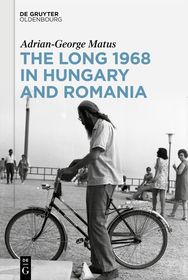
The Long 1968 in Hungary and Romania
-
5% KEDVEZMÉNY?
- A kedvezmény csak az 'Értesítés a kedvenc témákról' hírlevelünk címzettjeinek rendeléseire érvényes.
- Kiadói listaár EUR 104.95
-
43 528 Ft (41 455 Ft + 5% áfa)
Az ár azért becsült, mert a rendelés pillanatában nem lehet pontosan tudni, hogy a beérkezéskor milyen lesz a forint árfolyama az adott termék eredeti devizájához képest. Ha a forint romlana, kissé többet, ha javulna, kissé kevesebbet kell majd fizetnie.
- Kedvezmény(ek) 5% (cc. 2 176 Ft off)
- Kedvezményes ár 41 351 Ft (39 382 Ft + 5% áfa)
Iratkozzon fel most és részesüljön kedvezőbb árainkból!
Feliratkozom
43 528 Ft

Beszerezhetőség
Megrendelésre a kiadó utánnyomja a könyvet. Rendelhető, de a szokásosnál kicsit lassabban érkezik meg.
Why don't you give exact delivery time?
A beszerzés időigényét az eddigi tapasztalatokra alapozva adjuk meg. Azért becsült, mert a terméket külföldről hozzuk be, így a kiadó kiszolgálásának pillanatnyi gyorsaságától is függ. A megadottnál gyorsabb és lassabb szállítás is elképzelhető, de mindent megteszünk, hogy Ön a lehető leghamarabb jusson hozzá a termékhez.
A termék adatai:
- Kiadás sorszáma 1
- Kiadó De Gruyter Oldenbourg
- Megjelenés dátuma 2023. december 31.
- ISBN 9783111253091
- Kötéstípus Keménykötés
- Terjedelem301 oldal
- Méret 230x155 mm
- Súly 563 g
- Nyelv angol
- Illusztrációk 7 Illustrations, color 605
Kategóriák
Hosszú leírás:
This book advances a local, regional, and comparative analysis of the history of the sixty-eighters from Hungary and Romania between 1956 and 1975. The aim of the book is to answer to the following research question: to what extent does ?the long 1968? mark and change protest history? Another axis of my research, equally important, is: how can one genuinely distinguish between a protest, an opposition, and a pastime? Where did radicalisation truly begin, and when was it solely an auto-perception as a dissident? In other words, how can one truly distinguish between a leisure activity like listening to Radio Free Europe or exploring an altered state of consciousness, and an explicit political activity like organising a protest or writing subversive texts? Among other aims, the books?s scope is to understand where a leisure activity ends, and a protest starts. By ?practicing counterculture,? did the youth wish to contest the system or simply express themselves?
As method, oral history plays a crucial part. On a superficial level, the interviews helped to fill in the archival gap. However, oral testimonies proved to reveal much more than essential factual information. Oral history clarified how political and social events influenced the subjects' memory formation.
Több



